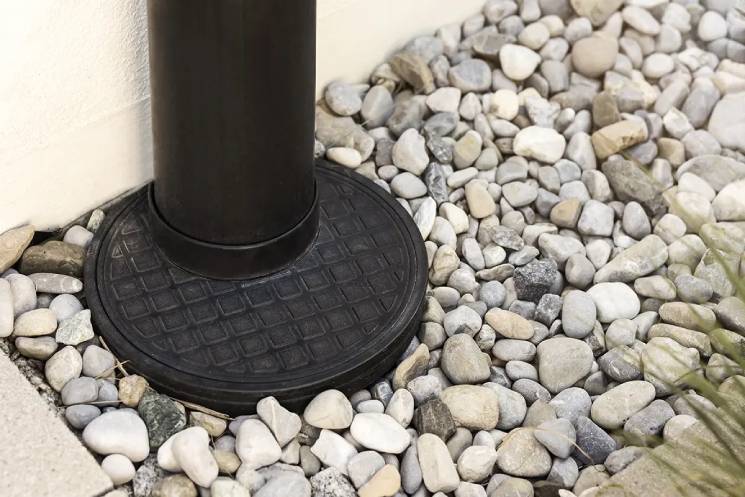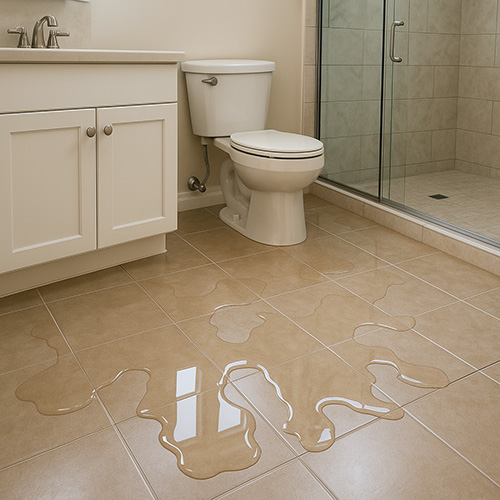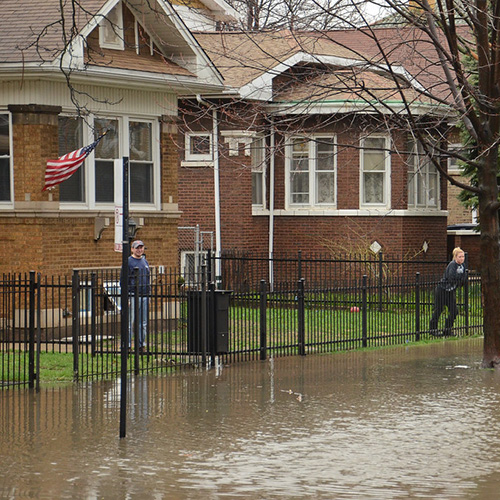
Protect Your Home from Flood Damage with an Advanced Flood Control System
Flooding is a serious and costly threat that can compromise your home’s structural integrity and lead to expensive repairs. Whether you live in an area prone to heavy rainfall, rising groundwater, or seasonal flooding, installing a flood control system is essential to prevent water from infiltrating your property. Without proper flood protection, water can seep into your basement, damage your foundation, and cause mold growth, leading to long-term issues for your home and health.
At First Chicago Plumbing, we offer customized flood control systems that are tailored to meet the specific needs of your property. Our systems are designed to provide maximum protection, ensuring that water is safely diverted away from your home, keeping your living space dry and secure.
Common Signs You Need a Flood Control System
Flooding doesn’t always announce itself with knee-deep water. Often, it starts with subtle issues that can worsen over time. Recognizing these early warning signs can help you protect your home before serious damage occurs:
- Water Stains on Basement Walls or Floors: Yellow, brown, or gray stains on concrete or drywall typically mean water is making its way through the foundation. Even if it seems dry, this moisture can compromise structural integrity and promote mold growth over time.
- Musty or Damp Odors: That stale, earthy smell in your basement or crawl space is a strong indicator of excessive moisture or poor ventilation. Even without visible water, this odor suggests ongoing dampness that can lead to mold, wood rot, and indoor air quality problems.
- Standing Water or Puddles After Rain: If you see water pooling near your home’s foundation or in your basement after storms, your current drainage system isn’t doing its job. This is one of the clearest signs that a flood control system is needed to redirect water properly.
- Cracks in the Foundation or Interior Walls: Expanding soil and shifting water pressure can cause cracks to form in foundation walls, floors, and even interior drywall. These cracks allow even more water to seep into your home, creating a cycle of damage that gets worse with every storm.
- Mold or Mildew on Surfaces: Mold thrives in damp, dark environments and spreads quickly. If you notice black, green, or white patches on walls, carpets, or insulation—especially in lower levels of your home—it’s a sign that water is entering your home consistently.
- Sump Pump Running Nonstop or Not at All: A properly functioning sump pump should run only when needed. If yours is running constantly, it may be undersized or compensating for drainage issues. If it’s not turning on at all during storms, it’s a serious risk that could lead to flooding during the next heavy rain.
- Efflorescence on Basement Walls: This white, chalky residue on masonry is caused by mineral deposits left behind when water evaporates. It’s often a sign of long-term seepage and indicates that water is slowly penetrating the walls.
- Increased Humidity Indoors: If your dehumidifier is always working overtime or you feel dampness in your air, you may be dealing with hidden moisture entering from below ground level.
If you’ve noticed one or more of these signs, it’s time to consider a custom flood control solution. At First Chicago Plumbing, we assess your home’s specific risks and design a system that keeps water out—permanently.

How Our Flood Control System Works
Our flood control system utilizes a combination of cutting-edge technology and proven water management strategies. The system typically includes:
- Sump Pumps: Installed at the lowest point in your basement, sump pumps automatically remove excess water that accumulates during heavy rainfall or snowmelt.
- Drainage Pipes: Our drainage system channels water away from your foundation to prevent water buildup around your home.
- Backflow Preventers: These devices ensure that water from municipal systems or floodwaters cannot backflow into your home through the plumbing system.
- Exterior Waterproofing: Additional waterproof barriers are applied to your foundation to block water from seeping through walls or cracks.
Our team of licensed professionals evaluates your property’s unique landscape and water flow patterns to design and install a custom system that delivers reliable flood protection.
The Importance of Flood Control for Homeowners
Ignoring the risk of flooding can lead to serious issues such as:
- Foundation Damage: Continuous exposure to water weakens your home’s foundation, leading to cracks, settling, and even structural failure.
- Basement Flooding: Water can easily accumulate in your basement, causing damage to stored items, appliances, and creating an ideal environment for mold and mildew growth.
- Mold and Health Risks: Damp environments encourage mold, which can be harmful to your health, leading to respiratory problems and allergies.
- Costly Repairs: Water damage is expensive to repair. By investing in a flood control system, you can avoid thousands of dollars in potential repair costs.
Why Flooding Is Common in the Chicago Area
Flooding is a frequent issue for many homeowners across Chicago and its northern suburbs. While severe storms can cause flash floods, many local flooding problems stem from a mix of environmental and infrastructure challenges specific to the region:
- Clay-Rich Soil: Much of the Chicago area sits on heavy clay soil, which doesn’t absorb water easily. During heavy rain, water tends to pool and run off rather than soak into the ground, increasing the risk of water seeping into basements and crawl spaces.
- Flat Terrain: Chicago’s relatively flat landscape slows down natural drainage. Without proper grading or flood control systems in place, rainwater often has nowhere to go—leading to pooling around foundations and slow water runoff.
- Aging Sewer Systems: Many communities in the North Shore and surrounding suburbs still rely on older combined sewer systems, where stormwater and sewage share the same pipes. During intense storms, these systems can become overloaded, pushing water back into basements through drains and plumbing lines.
- Rapid Urban Development: Increased construction and paving over the years have reduced the amount of permeable ground available to absorb rainwater. Asphalt, concrete, and rooftops create more runoff, overwhelming local drainage systems faster.
- Lake Michigan Proximity: For homes near the lakefront or along tributaries and rivers, water levels can rise rapidly during storm surges or after periods of sustained rain, increasing the likelihood of flooding.
- Climate Change and Heavier Rainfalls: The Chicago region has seen a noticeable increase in the frequency and intensity of storms. More rainfall in shorter periods overwhelms even well-maintained drainage systems, making flood protection more critical than ever.
If you live in areas like Skokie, Evanston, Niles, or Glenview, you may already be familiar with how quickly water can become a threat. Investing in a professionally designed flood control system is one of the most effective ways to protect your property and stay ahead of these growing risks.

Popular Flood Control Solutions in Chicago area
Chicago homes face frequent flooding risks due to aging infrastructure and heavy rains. That’s why many homeowners turn to proven flood control systems designed to block sewer backups and manage excess groundwater effectively. Some of the most common solutions include:
- Overhead Sewer System: Raises the sewer line above basement level to stop wastewater from backing up into the home during heavy storms.
- Flood Control Valves (Check or Shutoff Valves): Allow water to flow out but automatically close to block sewage from re-entering through drains or toilets.
- Drain Tile System: A network of perforated pipes installed around the foundation to collect and divert groundwater into a sump pit.
- Sewer Ejector Pit: Pump wastewater from lower levels (like basements) up into the main sewer line, preventing backups where gravity alone can’t help.
- Standpipes: Vertical pipes connected to floor drains that temporarily contain sewer backups, giving you time to respond before flooding spreads.
At First Chicago Plumbing, we install and service all major flood prevention systems. Our team can recommend the right setup for your home based on its age, layout, and location.
Why Choose Us for Flood Control?
- Proven Expertise: With years of experience in flood control systems, we understand how to protect homes from a variety of water damage scenarios.
- Durable, Long-Lasting Solutions: Our systems are built using high-quality materials, ensuring that your home is protected for years to come.
- Personalized Approach: Every home is different, and we tailor our systems to address your specific water management challenges.
- Ongoing Support: We don’t just install your system—we provide ongoing maintenance and support to ensure it continues functioning optimally.
Schedule a Free Flood Risk Assessment Today
Don’t wait until the next storm to take action. Contact us today to schedule a free assessment of your home’s flood risk and learn more about how our flood control systems can help protect your property. Let us provide the peace of mind that comes from knowing your home is fully prepared to handle the threat of flooding.






